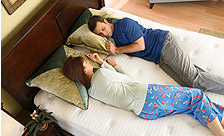
Guide to Better Sleep


Is there anything more miserable than lying in bed, staring at the clock, tossing and turning, thoughts racing, night after night…unable to fall asleep? Not much.
Unfortunately, studies show that as many as 70 million North Americans suffer from chronic sleep loss and/or sleep disorders. Women are especially vulnerable to sleeping problems. Research shows that they are two times more likely than men to have difficulties falling and staying asleep.
» Download PDFThe Importance of Sleep
To the chronically sleepless, the importance of sleep is more than obvious. Your dry eyes, drowsy mind, and drooping body are most likely screaming at you about just how important sleep is. However, lack of sleep can lead to much more than just drowsy days; inadequate sleep can also lead to problems in mood, learning, memory, heart, hormones, and obesity. Following is a summary of the many ways sleep can affect health:
Mood, learning and memory:Most people realize how sleep, or lack thereof, affects their mood. Studies show a distinct increase in irritability in the chronically sleepless. Some experts even link postpartum depression (“baby blues”) to the lack of sleep mothers of newborns typically receive. Learning and memory are also negatively influenced by lack of sleep. One recent study divided 48 healthy adults into three groups—a four-hour sleep/night group, a six-hour sleep/night group, and an eight-hour sleep/night group. Each day of the study the groups were given tasks to test their memory and motor skills. By day 14 the four-hour sleep/night group had 14 times as many errors compared with their normal abilities. The six-hour sleep/night group performed 11 times as many errors when compared with their normal abilities. In contrast, the group receiving eight hours of sleep per night performed the tasks consistently well and even performed better each day.
Heart health:During proper sleep cycles your heart rate and blood pressure drop by approximately 10%. If you are not sleeping enough this nightly dip in blood pressure may not occur. According to several studies, if this blood pressure dip does not occur you will be more likely to experience strokes, chest pain, irregular heartbeat, heart attacks, and even congestive heart failure.
Hormones:Deep sleep releases essential hormones such as growth hormones and sex hormones. Growth hormone fuels growth in children and boosts muscle mass and the repair of cells and tissues in children and adults. The sex hormones that are released are also important. These sex hormones help the progress of puberty in children and help aid fertility in adult women. Adequate sleep also creates more cytokines in the body—these cellular hormones help the immune system fight various infections. Lack of sleep puts your body under stress and triggers the release of stress hormones such as cortisol and adrenaline—these hormones exacerbate the abovementioned heart problems.
Obesity:Leptin is an appetite suppressant that increases during sleep. Grehlin is an appetite stimulant that decreases during sleep. Without enough sleep, the release of these hormones becomes reversed; a recent sleep study demonstrated that healthy individuals sleeping for only four-hours, two nights in a row experienced a 20% drop in leptin (appetite suppressant) and a 20% increase in grehlin (appetite stimulant). Insulin is another hormone that is influenced by sleep patterns. In one study, 14 healthy, young individuals were allowed to sleep for only four hours a night for six nights in a row. At the conclusion of the study, these healthy, young individuals had insulin and blood sugar levels that mimicked those found in people developing diabetes. Chronic sleeplessness may also promote obesity because it leaves individuals too tired to exercise.
Causes of Sleep Disturbances
There are many psychological disorders that can negatively influence sleep. Schizophrenia, bipolar disorder, anxiety disorder, depression and autism are all disorders that have been linked to sleep problems. Depression and anxiety, both more prevalent in women, are particularly common. Anxiety frequently impairs falling asleep at night, while depression usually causes early morning wakefulness.
Physical disorders that may interfere with proper sleep include sleep apnea, restless legs syndrome, narcolepsy, and parasomnias (such as sleep-walking, sleep paralysis, and night terrors). If you suspect you are suffering from any of these psychological or physical disorders, you should seek professional help.
Psychosocial stress may also threaten good sleep. For example, many young women skip sleep in order to cope with work and their roles as wives and mothers. As women age, sleep disturbances may continue because of physical and hormonal changes that make sleep lighter and less sound. Sleep disturbances are especially common during menopause.
Simple Sleep Solutions
Now that we’ve reviewed the importance of adequate sleep, and common causes of poor sleep, it’s time to discover what can be done to reap the benefits of a good night’s rest. Fortunately, in the groggy world of the sleepless there are many things you can do to help yourself. Read on for several simple solutions:
Schedule:Start with a regular schedule--just like babies and children, adults can benefit from a regular bedtime routine and a consistent bedtime schedule. Waking at the same time each morning will also help individuals to fall asleep at night. Avoid naps after three p.m.—if you must have a nap to make it through the day, schedule it for early afternoon—any later and it will be difficult to fall asleep at bedtime.
Exercise:Exercising at the right time of day can promote better sleep. Experts suggest exercising in the late afternoon and the early evening. Exercising too late in the evening will have the opposite effect.
Caffeine/nicotine/alcohol:Caffeine, a known stimulant, should be avoided past mid-afternoon. It stays in your body for many hours after your last drink—if you crave a sip of something warm in the evening, try milk or herbal tea. Nicotine is another stimulant to be avoided—nicotine may lead to lighter sleep. Nicotine withdrawal, in heavy smokers, may also cause you to wake too early. Although alcohol is a sedative that makes it easier to fall asleep, it prevents deep sleep and REM sleep, allowing only the lighter stages of sleep. Like heavy smokers, people who drink alcohol may also wake up in the middle of the night when the effects of an alcoholic “nightcap” wear off.
Large meals and beverages:If sleep is what you want, large meals and beverages should be avoided close to bedtime. Even if you are able to fall asleep, overeating and drinking have been shown to interfere with deep sleep. A large meal may cause lighter sleep as the body deals with digestion; too much liquid can also interfere by causing middle of the night trips to the bathroom.
Relax:Relaxation therapy has been used effectively to treat insomnia. You can practice this therapy yourself by progressively tensing and relaxing each of the muscles in your body—start at your toes and work your way all the way up to your facial muscles. Another relaxation technique to try is deep breathing. To begin, sit up straight in a comfortable position. Next, breathe in slowly through your nose and exhale slowly through your mouth. Repeat 2-3 times. Don’t lay in bed awake: People suffering from insomnia can enter into a vicious cycle—trouble falling asleep the previous night leaves them worried about falling asleep the next night, this worry keeps them awake and the cycle begins. To break the cycle of anxiety, try only going to bed when you’re sleepy. If you find yourself in bed, unable to fall asleep after 20 minutes, get out of bed and engage in a relaxing activity, such as reading. Once you feel sleepy again, return to bed. If you are still unable to sleep, hop out of bed again and pursue a relaxing activity until you are sleepy. This reconditioning therapy has been used effectively to treat insomnia.
Hot bath:Not only can hot baths be a great way to wind down at the end of a hectic day, they also provide a drop in your body temperature that helps you feel sleepy.
Sunlight exposure:
Sunlight exposure is essential to regulating sleep patterns. You should aim for at least 30 minutes of natural sunlight a day. Experts recommend that individuals who are having sleep troubles should raise their time in the sun to an hour a day.
Good sleeping environment: Rid your bedroom of anything that might distract you—bright lights, noise, televisions, computers and too warm temperatures should all be avoided. Sleep comes easier to those in dark, cool, quiet bedrooms supplied with a comfortable mattress, pillow, and blanket.
Hopefully, one or more of these self-help suggestions will bring you the relief you need…if not, it may be time to see a doctor. Your doctor may be able to diagnose your problem through specialized tests such as a polysomnography (an overnight sleep study conducted in a lab), or a multiple sleep latency test (MSLT) which measures daytime sleepiness. For certain situations, your doctor may prescribe sleeping pills as a short term solution. Or, she may change or discontinue medications that are disrupting your sleep.
Everyone needs, and deserves, adequate sleep—it is as essential to your health as proper exercise and nutrition. Although it may take a while to discover your specific sleep formula—relief is in sight. So…sweet dreams…sleep tight…don’t let the bedbugs bite!


 Copyright © 2026 |
Copyright © 2026 |